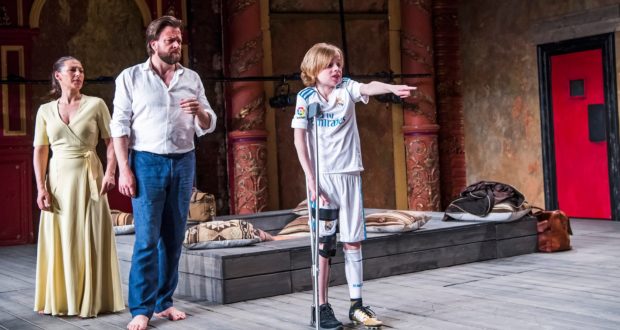Pros: Little Eyolf has modern relevance, which is highlighted by transposing the action to the present day. Capable actors, right down to Eyolf himself, manage the intensity and complexity of the play.
Cons: The lighting can seem a little haphazard, and the surtitles have the odd typo. A mid-play moment designed to be poignant didn’t quite work for me. If you’re new to the story, avoid the programme’s spoiler-heavy essay until afterwards. An Ibsen play successfully transported to the present day by some of Norway’s finest actors, in a near-flawless production. Norwegian language with surtitles sounds daunting, but it isn’t.
Summary
Rating
Excellent
Everyone should see an Ibsen play at least once in their life, and the National Theatre of Norway’s version of Little Eyolf is the perfect example of why. Henrik Ibsen’s dramas are known for being distinctive, gripping and full of moral dilemmas, but to see them unfold in his native language is an extra treat.
Here, we have a domestic drama: Rita, a sexually frustrated wife and mother; Alfred, an impulsive husband and father; their disabled child, Eyolf; plus Alfred’s sister, Asta, who awkwardly used to have the nickname Eyolf. Firstly, a quick warning: I made the mistake of reading the programme’s essay, which gave away the entire plot. Everyone loves the odd spoiler, but – having purposefully come to this play without scouring Wikipedia – I felt cheated of suspense here.
Eyolf (a fine debut from Sebastian Sørlie Lamb) is a sort of Tiny Tim figure to most of the characters: a sweet but unfortunate child who just wants to join in with everyone else and overcome his disability. He creates as much sympathy as the admittedly cute dog carried by the Rat Wife, a travelling pest controller who pops by to shake things up.
Yet Eyolf’s mother, Rita (a fiery Pia Tjelta), unashamedly resents him for taking her husband’s attention and time, painting him as a wolf in sheep’s clothing, or at least in a football shirt. Her attitude was shocking when Ibsen was writing this play in 1894, and wives were supposed to see raising children as their true purpose, but it’s also controversial today. Think of the backlash every time an anonymous article appears in a magazine confessing that the writer hates their child, feels motherhood has stolen their identity, or wishes they hadn’t had children at all. Furthermore, the incident behind Eyolf’s disability could be straight out of a Jeremy Kyle episode in 2018, though presumably Social Services would keep an eye on the family for years to come, and Rita would become insanely jealous of the social workers interrupting her life with Alfred (Kåre Conradi).
As for the surtitles projected high onto the back wall, they didn’t feel distracting; anyone who watches Scandi dramas will know you can become quickly engrossed. The odd typo leaped out at me, and sometimes the surtitles slipped in front or behind of the actors’ dialogue pace, but these moments were few and far between. Besides, acting is far more than just saying words: it’s in the partnerships, the gestures and so much more, and the professionalism of the cast is clear.
Most of the modern updates work fine in this production, but the lighting often jars, and a brooding mid-play episode featuring smoke and dry ice has an unintentional comic tone when the props man wielding the smoke machine sprays Alfred, whose arms are spread wide, as though to cleanse him; all I could think of was the spray tanning in Strictly Come Dancing.
In contrast to the timeless feel of the events, change is at the root of this play, and ‘the law of change’ is a repeated phrase in the script. Is friend of the family Borgheim a doe-eyed sap unworthy of Asta’s time (side-note: Asta’s body language around him is brilliant), or could he evolve into a pillar of strength? And can Eyolf ever be more than the little elephant in the room?
Like the rest of Ibsen’s oeuvre, Little Eyolf was a work ahead of its time, full of feistiness and barely-hidden emotions. It’s a treat to have it performed in Ibsen’s language, and in such a strong production by Sofia Jupither. Tusen takk.
Author: Henrik Ibsen
Director: Sofia Jupither
Producer: National Theatre of Norway and the Norwegian Ibsen Company
Booking Information: This show has now completed its run.
 Everything Theatre Reviews, interviews and news for theatre lovers, London and beyond
Everything Theatre Reviews, interviews and news for theatre lovers, London and beyond



